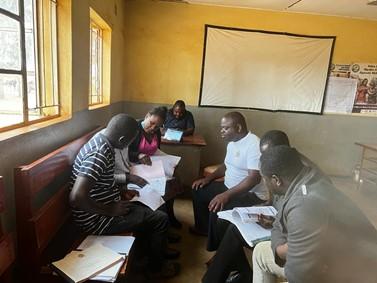Malawi’s National Malaria Control Programme (NMCP) has been implementing periodic district mentorship to strengthen data management capacity at the facility level. This intervention improved reporting rates and timeliness of data entry into DHIS2 to 96% and 90% (2022) from 91% and 68.2% in 2018 respectively; however, data accuracy has historically been a challenge in the country, discouraging the NMCP from using data directly from DHIS2.
In response to this challenge, the USAID-funded Country Health Information Systems and Data Use (CHISU) program worked with the NMCP to develop a Data Quality Assurance (DQA) job aid based on the Measure Evaluation RDQA tool and the World Health Organization Data Quality App for DHIS2.
The job aid aims to institutionalize routine data quality verification and cleaning of malaria data in DHIS2, ensuring data reliability and improving data use for evidence-based decision-making in malaria program management in the country.
According to Austin Gumbo, NMCP Monitoring & Evaluation Manager, there has been a gap between our regular verification efforts of the registers and the data stored in DHIS2: “This job aid enables us to implement DHIS2 remedial actions to the data verification that the Programme has been implementing, thereby ensuring that DHIS2 malaria data matches corrected facility level data.”

In 2022, CHISU trained 64 staff across eight of the country’s 29 districts on the use of the tool for regular data quality verification and systematic DHIS2 data cleaning to enable the use of malaria data directly from DHIS2. Since the training, the staff has been able to conduct regular data verification exercises, which is gradually improving data quality in the eight districts targeted.
CHISU initiated discussions with the NMCP Central Monitoring and Evaluation Division (CMED) and the Digital Health Division to expand this approach to the 21 remaining districts. The Global Fund to Fight AIDS, Tuberculosis and Malaria will support this scale-up. Similar job aids will be developed for other health areas with support from the World Bank. This demonstrates the value of the collaborative approach that CHISU has taken, working together with stakeholders to serve as a catalyst for improvements in malaria data as well as other health areas.
“The Malaria Data Quality job aid provides practical steps for institutionalizing data quality improvement interventions, which are a key priority in the monitoring, evaluation and Health Information Strategy of the Ministry of Health. Apart from Malaria, CHISU will work with CMED in adapting the tool for use in other programs, which greatly contributes to the overall quality and reliability of data across the health sector,” explained the CHISU Resident Advisor in Malawi, Jacob Kawonga.